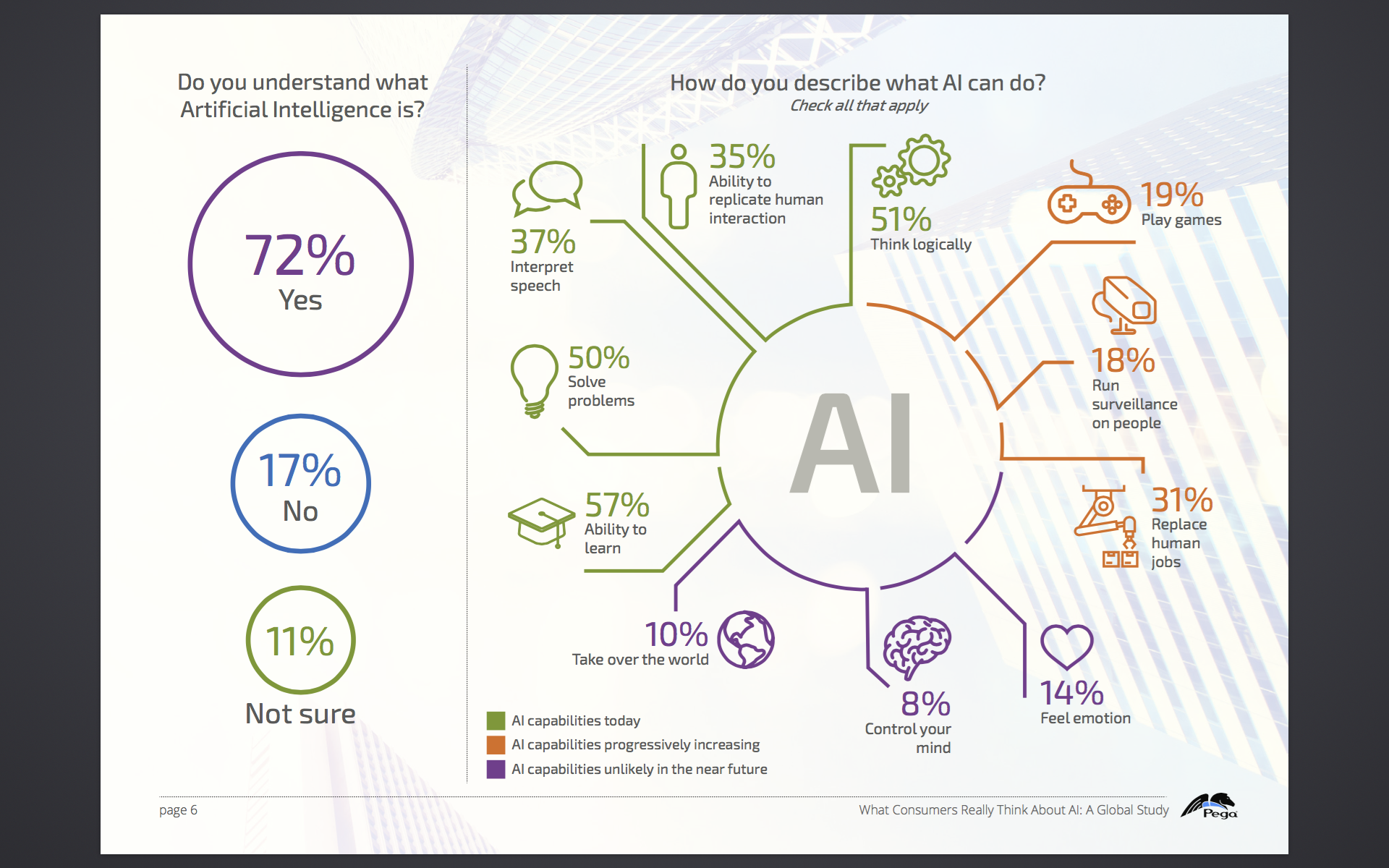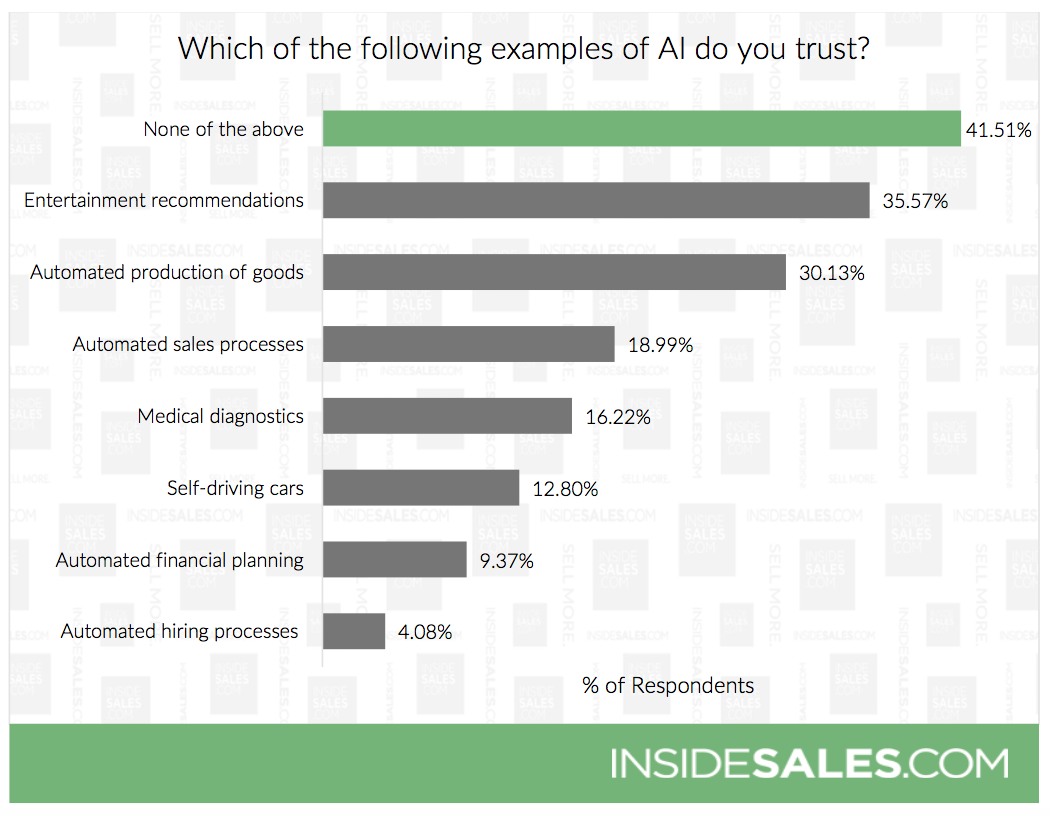Two new reports: Many consumers afraid of, and confused by, artificial intelligence
Separate studies by Pegasystems and InsideSales depict ‘fear and confusion,’ but offer some strategies for AI-using businesses.
What do consumers think about artificial intelligence (AI)?
That’s the central question asked by two separate, recently released studies. As it turns out, a similar picture emerges in “What Consumers Really Think About AI: A Global Study,” by Pegasystems, a provider of customer relationship management and business process management software, and in “The State of Artificial Intelligence, 2017: Public Perceptions of the Most Disruptive Technology,” by sales acceleration platform InsideSales.
In short: some consumers are fine with AI but many are nervous, even fearful. By and large, they don’t quite recognize how they’re already using it. But businesses can help with the acceptance of AI-backed systems by applying some key strategies.
Pega, which queried 6,000 consumers in six countries, found that only slightly more than a third liked the idea of businesses employing AI to engage with them — even if it resulted in a better customer experience.
And an overwhelming 72 percent indicated some level of fear. In fact, a quarter are worried about artificially intelligent beings taking over our planet.
At the same time, according to Pega, the same percentage — 72 percent — also said they understand AI, yet only 41 percent actually knew that Amazon’s Alexa and Google Home intelligent assistants utilize AI.
InsideSales, which asked nearly 2,000 people in the US, found that 42 percent of consumers don’t trust AI, although nearly 55 percent say they have used it outside of work.
“We found a lot of fear and confusion about AI is hanging over customers’ heads, and that inhibits them from embracing more AI devices and services,” Pegasystems Product Marketing Director Vince Jeffs told me via email.
A lot of the fear, he pointed out, comes from the confusion.
“The majority of them think they know AI,” he said, “but the data showed they couldn’t identify basic capabilities like learning and problem solving.” In that sense, consumers confusion about AI echoed findings about marketers’ attitudes toward the tech.
Pega’s report found that only 34 percent of respondents thought they were exposed to AI in their daily lives, but 84 percent actually were — through intelligent assistants, chatbots, email spam filters, predictive search terms, Facebook-recommended news, online shopping recommendations, reverse image searching, predictive product suggestions like Netflix’s movie recommendations and other encounters.
InsideSales CMO Michael Plante told me via email that “consumers are relatively unaware of how much they use AI daily in their lives,” probably because companies don’t make a point of mentioning it. At work, he said, AI tech is “mostly absent, but people want to see it there.”
The more familiar respondents were with AI, Pega said, the more comfortable they were with it. Of those who felt they had familiarity with AI, 55 percent were comfortable with business uses. Of those who had no experience, only 25 percent were.
Even with such trepidation, Jeffs pointed out, Pega’s study found that “68 percent said they’d be more open to AI if it helped them in their daily lives.”
To help expose consumers to AI and increase their comfort, Jeffs and the Pega report suggested that businesses should:
- Make sure that AI-powered engagements with customers truly deliver “exceptional” experiences, making their lives better instead of more complicated. “The time for talk and hype is over,” he said. “Now they have to prove its value.”
- Make sure the deployed systems can support the complete customer experience that consumers expect. For instance, AI-powered bots that repeatedly say they don’t understand what you’re writing is a step backward. AI-based encounters should be “conversational, contextual,” and adjusted in real time for the conversation. Plus, human employees should be teamed with AI-powered systems when that offers the best experience, and customers should be given AI-based support when needed.
- And make sure to let consumers know, in “subtle ways,” when great experiences are powered by AI. The Pega study found that 88 percent want to know when bots are automated and using AI, for instance, and that they’re not text-communicating with a human. “The customers should never feel like their vendor is trying to put one over on them,” the report said.
So, why would a CRM/BPM software provider and a sales acceleration platform want to research and create their first reports on consumer attitudes toward AI?
Pega’s Jeffs said his company — which uses AI in its software — wanted to get more insight about how consumers react to such AI implementations as service bots, recommendation engines and virtual assistants, and thus better understand how and where businesses could leverage AI for customer engagements.
InsideSales similarly utilizes AI in its business, and it wanted stats to back up anecdotal evidence that “AI technology is greatly underutilized in the workplace,” Plante told me. The company also wanted to understand how attitudes differ across generations, income levels and geographies, and to determine which sectors of the economy were “most ripe for disruption” as the technology comes into broader use.
Marketing Land – Internet Marketing News, Strategies & Tips
(45)

















